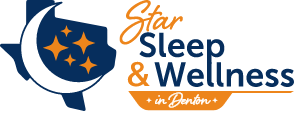
Did you know that sleep apnea diagnoses have been increasing? Approximately 39 million adults in the United States suffer from this condition in which your breathing repeatedly stops and starts at night. This interrupts your sleep cycles and causes excessive daytime exhaustion, headaches, and trouble focusing, in addition to more serious health concerns. In time it can contribute to cardiovascular disease and diabetes, for example.
In some cases, biology is to blame. Those who have a narrow throat or a thicker neck sometimes develop this issue because their tissues block their airway. That said, some factors within your control can prevent sleep apnea. Keep reading to learn about 4 of them!
Factor #1: Body Weight
Unfortunately, obstructive sleep apnea is most common in individuals who are overweight or obese. This is because their bodies create extra fat deposits in their neck, called pharyngeal fat, which can block your breathing when your throat muscles relax. The good news is that you can reduce the impact by eating a well-balanced diet and exercising regularly. 150 minutes of activity per week is recommended to improve your health.
Factor #2: Positioning
The way you snooze at night can affect your sleep apnea, too. If you fall asleep on your back, then your tongue and soft palate end up pressing against the back of your throat which once again blocks your airway. You avoid this, try to slumber on your side, instead. It can be challenging to coach your body into resting in this new position if you’re not accustomed to it. Try placing pillows behind you to prevent you from rolling back into your habitual pose.
Factor #3: Nasal Passages
If you have allergies or are fighting off a cold, your nasal passages get blocked by congestion. This can also halt your breathing off and on throughout the night. Try using a saline nasal spray before bed to open them up, or rinse with a nasal irrigation. You can also ask your doctor about nasal decongestants and antihistamines. These can certainly help with the issue but aren’t intended for long-term use so it’s important that you consult with a professional.
Factor #4: Medications
Sometimes your sleep isn’t interrupted by a physical blockage but by interference with brain signals that control your muscles. Certain medications like sedatives, opioids, and benzodiazepines like Xanax and Valium play a role in this disorder. Alcohol and sleeping pills can also interfere with a regular sleep cycle so it’s best to avoid them if you’re concerned.
By addressing these potential pitfalls, you can keep your sleep apnea to a minimum!
About the Practice
At Star Sleep & Wellness in Denton, you benefit from a team of board-certified sleep specialists with years of experience helping patients get a good night’s rest. They’ve delivered life-changing results to more than 20,000 patients over 25 years. They provide testing to diagnose what kind of sleep disorder you’re dealing with then create a personalized plan to meet your needs. If you’d like a consultation, you’re welcome to request an appointment on the website or by calling (469) 772-6721.
